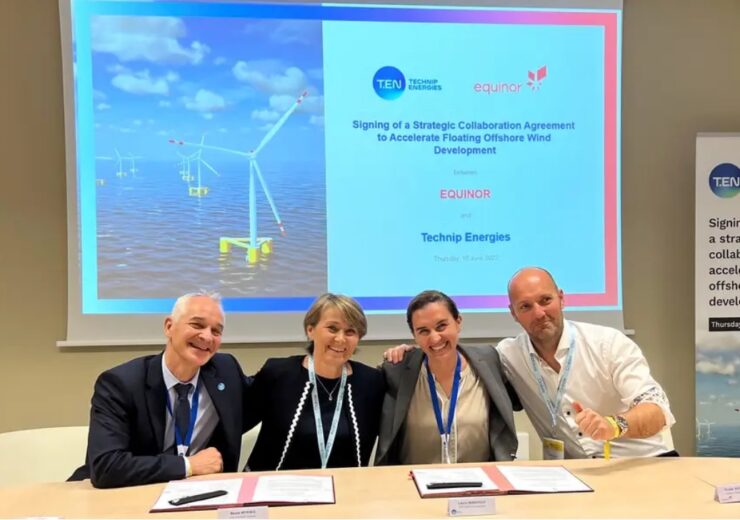The two companies come together to develop floating wind steel semi substructures that aim to accelerate technology development for floating offshore wind, enable cost reductions and develop local value opportunities

Photo from the signing ceremony during Seanergy conference in France: Willy Gauttier (left), vice president Offshore Floating Wind BU Technip Energies, Beate Myking, senior vice president Renewables Solutions Equinor, Laure Mandrou, senior vice president Carbon-Free Solutions Business Line of Technip Energies, and Frode Sivertsen, manager Supply Chain Equinor. (Credit: Equinor ASA)
The strategic collaboration between Equinor as a leading floating offshore wind developer and Technip Energies as a leading supplier of floating offshore wind substructures, was announced during the Seanergy conference in Normandie, France.
The collaboration builds on the two companies’ joint ambition of driving the industrialisation of floating offshore wind.By teaming up at an early design phase of a floating wind farm project, the two parties seek to unlock value from leveraging complementary competencies in technology and fabrication.
“We see longer-term collaboration from an early phase as the next step within floating offshore wind development. This will also enable us to identify and create opportunities for the local supply chain in the markets where we are present”, says Mette H. Ottøy, chief procurement officer, Equinor.
“We’re excited about our collaboration with Technip Energies, which allows us to further leverage and develop our floating toolbox to customize locally adapted industrial solutions for future floating offshore wind projects,” says Beate Myking, senior vice president for Renewables Solutions in Equinor.
Growth in renewables is needed to succeed with the energy transition. A large part of this will come from floating wind as approximately 80 per cent of the wind resources offshore are in deep waters that require a floating wind turbine solution.
With five decades of experience with floating offshore technology and twenty years of floating offshore wind experience and innovation, Equinor has developed a floating toolbox comprising of a set of design principles and solutions that are applicable across floating wind concepts that will enable more local content and industrial standardisation.
Even though costs have come down substantially, there is still a way to go for the floating technology to reach commerciality.
Equinor believes the way to commercialization of floating wind lies with technological development together with suppliers. From building the world’s first floating turbine, Hywind Demo, to the world’s first floating wind farm, Hywind Scotland, Equinor reduced the cost per megawatt by 70 per cent. With Hywind Tampen, which will be the world’s largest floating wind farm located off the coast of Norway, costs are further reduced by 40 per cent.
“We have already started to see early signs of value creation from this way of working in our early-phase floating wind projects in Southern Brittany in France and Firefly in South Korea,” says Myking.
Equinor is technology agnostic, and through our floating wind toolbox we see that the floating concept of choice for a given market will differ according to geographies. Equinor will always select the best suited concept for its projects.
“We believe partnering is an essential step to reach net-zero. We are proud to enter this strategic partnership with Equinor, a long-lasting client with which we share a common vision and commitment: create a low-carbon future, said Laure Mandrou, senior vice president Carbon-Free Solutions Business Line of Technip Energies.
Source: Company Press Release
